Quality and Safety — What does it mean for your NDIS Business?
The NDIS Commission’s Role in Quality and Safety
The NDIS Quality and Safeguards Commission (NDIS Commission) operates as an independent agency to monitor and improve the quality and safety of NDIS supports and services. The NDIS Commission oversees and implements a nationwide and consistent Quality and Safeguarding Framework. Integral to this Framework are the NDIS Code of Conduct, the NDIS Practice Standards and Quality Indicators and nation-wide Worker Screening. The Quality and Safeguarding Framework provides the infrastructure to achieve safe and quality supports for NDIS participants.

Essentially, the NDIS Commission works with NDIS participants, service providers, workers and the community to make sure participants have choice, control and dignity and are able to access high-quality supports and services in safe environments. It achieves this by:
- Registering and regulating NDIS providers;
- Receiving and actioning feedback and complaints from people with disability who have concerns about the safety and quality of NDIS funded supports and services;
- Responding to reportable incidents, including violence, abuse, neglect, exploitation and discrimination of NDIS participants;
- Monitoring compliance with the NDIS Code of Conduct and NDIS Practice Standards, including undertaking investigations and taking enforcement action for non-compliance;
- Monitoring the use of restrictive practices within the NDIS with the aim of reducing and eliminating these practices; and
- Implementing national NDIS Worker Screening checks.
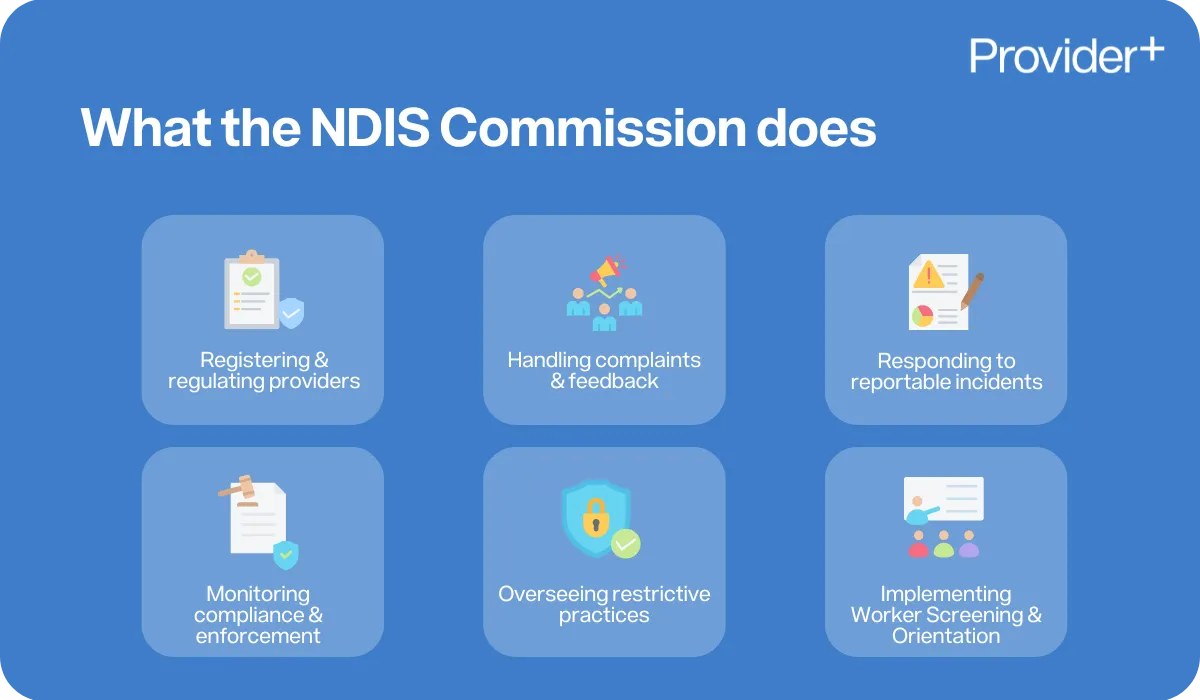
Worker Orientation Module: ‘Quality, Safety and You’
The NDIS Commission’s Worker Orientation Module: ‘Quality, Safety and You’ is mandatory training for all NDIS providers and workers in the disability sector. It is an interactive online course that explains the obligations of workers under the NDIS Code of Conduct – from the perspective of NDIS participants.
The training was developed in consultation with NDIS providers and people with disability. It takes approximately 90 minutes to complete the four modules. It is free, available online and can be done at your own pace. To access the course, go to the Commission’s website at www.ndiscommission.gov.au/trainingcourse.
Registered NDIS providers must include the module in their worker induction and encourage existing workers to undertake the module over time as part of their ongoing learning and development, and to support compliance with the NDIS Code of Conduct.
Why is the Worker Orientation Module essential for providers?
The training is designed with people with disability at its centre. Every recorded conversation included in the online training is led by NDIS participants. They explain what the NDIS Code of Conduct means to them, what makes them feel safe and what they expect in terms of safety and quality in service delivery — noting that ‘safe’ does not mean being ‘wrapped up in cotton wool and not having an ordinary life’.
The focus of the training is to encourage workers to consider and respond to different scenarios in the context of supporting a person with disability. The objective is that, on completing the training, workers will have an understanding of the role of the NDIS Commission and their roles and responsibilities under the Code of Conduct to deliver safe and quality services, within the context of human rights, respect and risk.
Specifically, the training includes the following:
- The NDIS
What the NDIS is, why it is needed, and how workers can support people with disability to achieve the NDIS's vision.
- The NDIS Quality and Safeguards Commission
The role of the NDIS Commission and how it handles complaints about the quality and safety of NDIS services.
- The NDIS Code of Conduct
The ethical and appropriate conduct that NDIS workers and providers should follow.
- Worker responsibilities
How workers should act with respect, integrity and honesty, and how they should respond to alleged or actual instances of violence, abuse, neglect and exploitation of a participant.
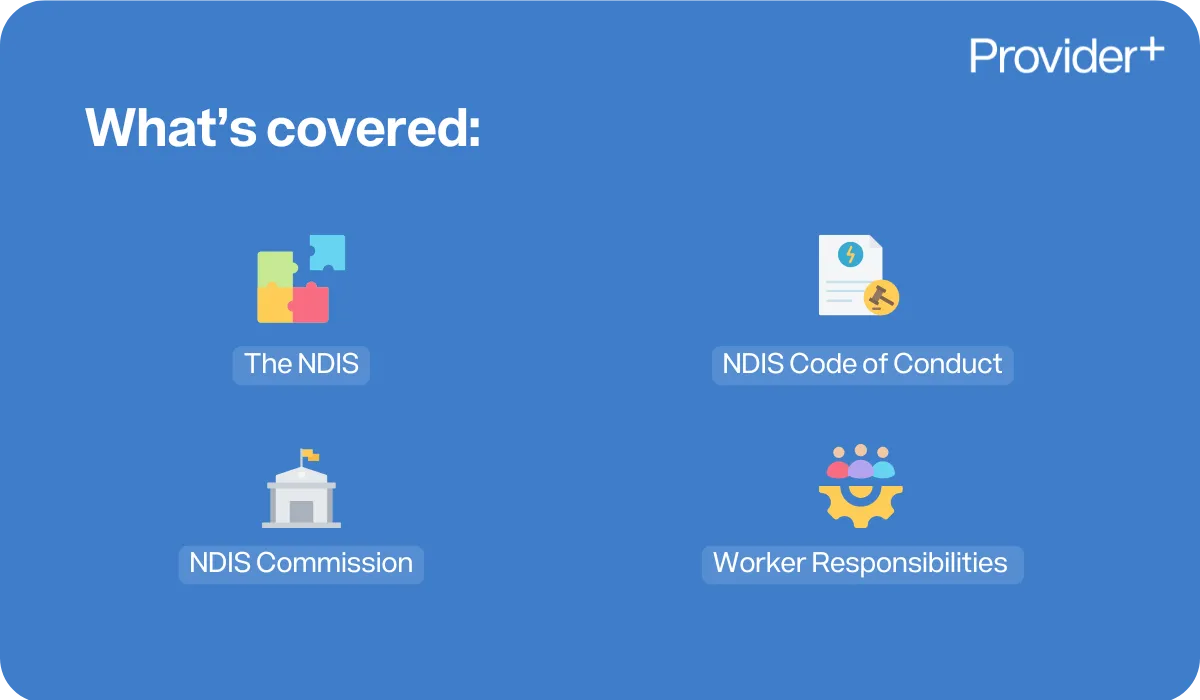
Key takeaways from the Module
The Worker Orientation Module ‘Quality, Safety and You’ helps you understand what the NDIS is; the role of the NDIS Quality and Safeguards Commission; your responsibilities under the NDIS Code of Conduct and your role in achieving the vision of the NDIS.
Because it has been created alongside people with disability, you'll learn through real stories, the challenges people with disability face, what safe and quality services look like for them and how to meet your obligations and provide safe and quality services and support for people with disability.
On successfully completing the module, you will receive an industry recognised Certificate of Completion to share with your employer and future employers.
Each one of us has a role to play in making Australia a fair, safe and inclusive place for every Australian — and ensuring safety and quality in service delivery for the vulnerable members of our community.

So... What's your role in this story?
How to integrate these principles into your NDIS services
NDIS supports evidence-informed practice to ensure quality and safety in participant service delivery. It is a collaborative process that takes into account each person’s circumstances, needs, preferences, goals and values. Implementing quality and safety into service delivery requires consideration of how best to work with that person and evaluate outcomes in partnership with the person. This means:
- Respecting and upholding a person’s human and legal rights.
- Recognising that the person with disability is an expert in their own life.
- Focusing on a person’s identity, their unique values, beliefs, preferences, priorities and circumstances.
- Including and considering people important to the person with disability, such as friends and family (with their permission).
- Supporting self-determination and decision-making.
Safety
- Provide supports and services safely, with care and skill.
- Act when something might affect the quality or safety of supports you provide. This includes making sure a transition of care (to hospital or another provider) is safe.
Respect
- Respect the rights of people with disability. This includes their right to privacy, freedom of expression, self-determination and decision making.
- Act with integrity, honesty and transparency. You MUST NOT pressure or harass people with disability, or make false or make misleading claims about services you can provide.
Duty of Care
- Take action to prevent and respond to violence, exploitation, neglect and abuse (including sexual misconduct) of people with disability.
- Help participants to get the supports they need if their circumstances change.
Consequences
Penalties apply if you do not meet your obligations under the NDIS Code of Conduct. This includes banning individuals and businesses from working with people with disability, issuing fines and infringement notices, and other sanctions
The Code is an important part of the NDIS Quality and Safeguarding Framework. It promotes the health, safety and wellbeing of persons with disability, by setting out acceptable, appropriate and ethical conduct for NDIS providers, key personnel and workers delivering supports or services in the NDIS market. The obligations in the Code are fundamental to the rights of people with disability set out in the UN Convention on the Rights of Persons with Disabilities. They are also broad, to account for the diversity of people with disability and their support requirements.
Mapping Out your Next Steps
Ready to make your NDIS vision a reality? Get in touch with Provider+ for support in registration, audit coaching, and more.
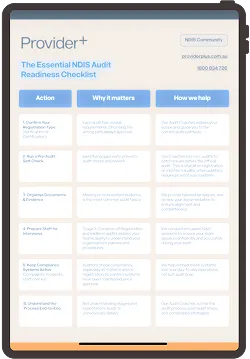
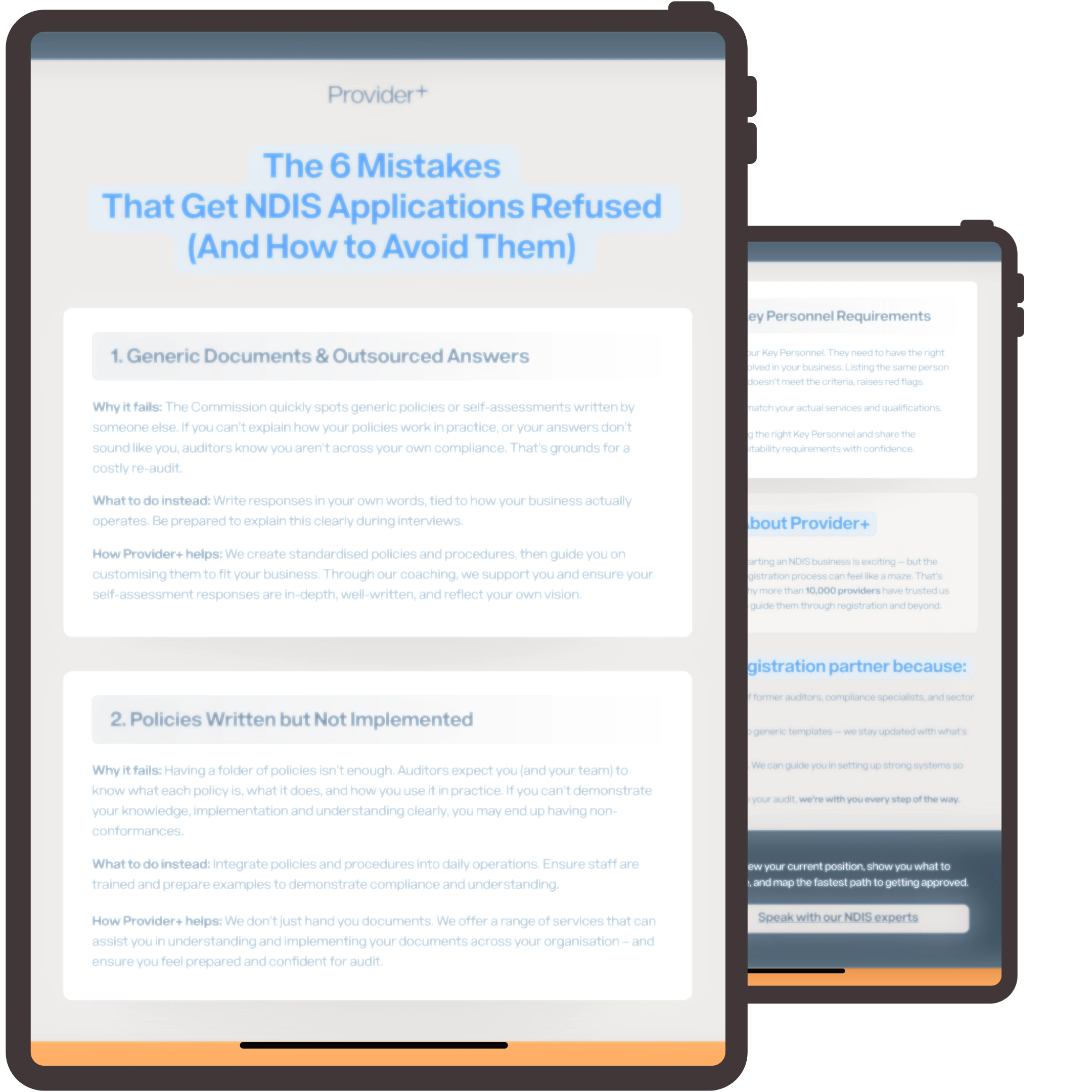
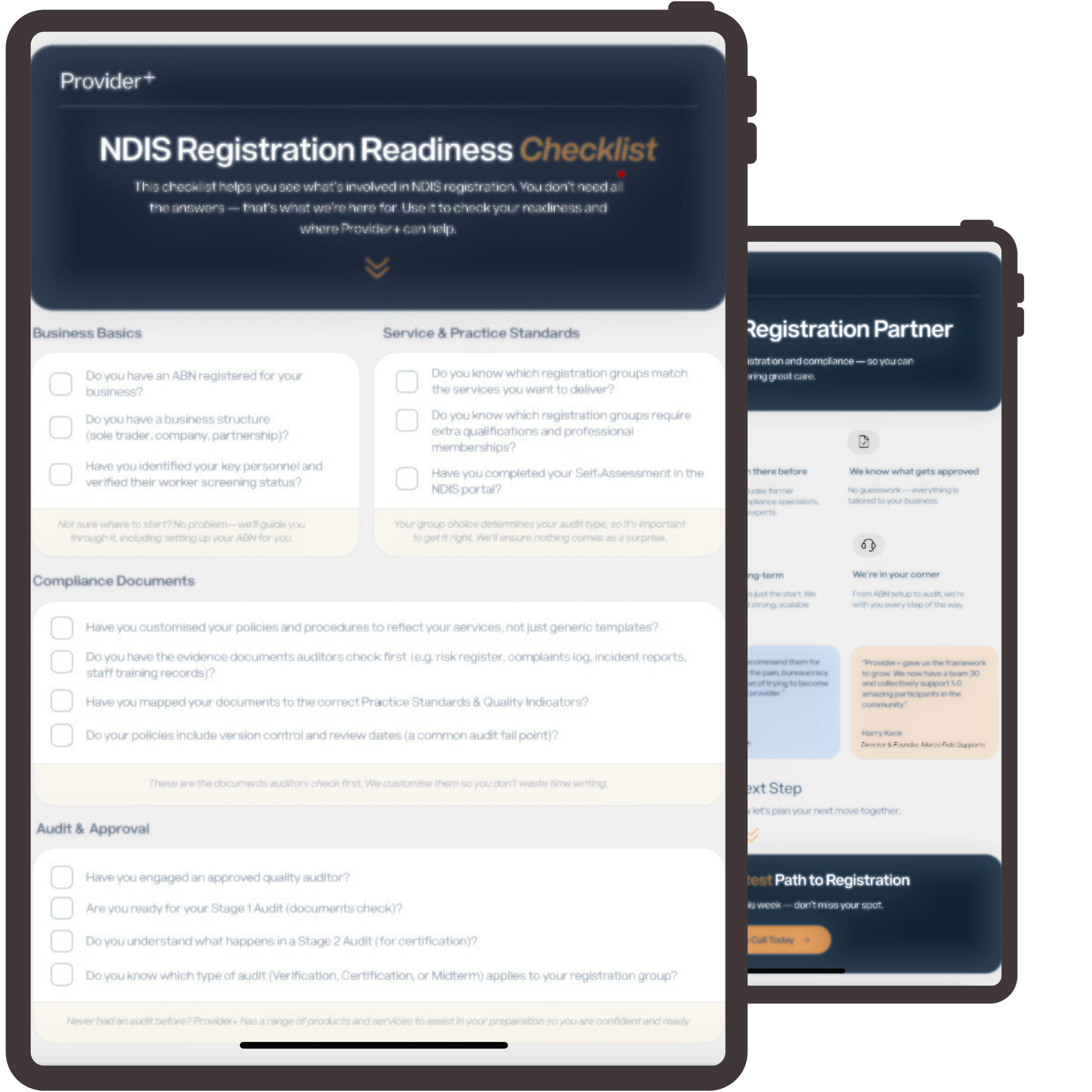

































FAQs
Here is our frequently asked questions.

.webp)
